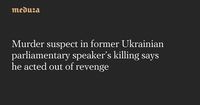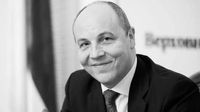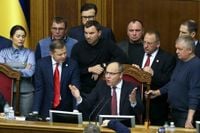In the heart of Lviv, just a few days after the city was shaken by tragedy, hundreds gathered under the sweltering September sun outside St. George’s Cathedral. The crowd, somber and resolute, had come to mourn Andriy Parubiy, a former speaker of Ukraine’s parliament and a towering figure in the country’s pro-European political movements. Parubiy, 54, was gunned down in broad daylight on August 30, 2025, in an attack that has since gripped Ukraine and sent shockwaves through its political establishment.
Parubiy’s funeral procession wound through the city’s central square before he was laid to rest at Lychakiv Cemetery, a resting place for many of Lviv’s most celebrated citizens. According to the Associated Press, the outpouring of grief reflected not just respect for Parubiy’s long career, but also a collective anxiety about the violence that claimed his life. Senior government officials, regional leaders, and ordinary citizens stood shoulder-to-shoulder, honoring a man whose political journey had mirrored Ukraine’s own tumultuous path toward independence and democracy.
Parubiy’s legacy was forged in the fires of the Orange Revolution in 2004, where he first rose to prominence as an activist. He later commanded self-defense volunteer units during the Maidan protests of 2014, which ultimately forced pro-Russian President Viktor Yanukovych from office. As parliamentary speaker from 2016 to 2019, Parubiy championed Ukraine’s sovereignty and the use of the Ukrainian language, often standing in stark opposition to Russian influence. He had, in fact, survived an assassination attempt by grenade in 2014, a stark reminder of the dangers faced by Ukraine’s reformist leaders.
But on that fateful Saturday in August, Parubiy’s luck ran out. The attacker, later identified as 52-year-old Mykhailo Stselnikov, allegedly tracked Parubiy’s movements with chilling precision, shooting him at least eight times before fleeing the scene. The killer’s escape triggered a citywide police operation, codenamed Siren, and set off a nationwide manhunt. Within a day, police apprehended Stselnikov in the Khmelnytskyi region, more than 100 kilometers from Lviv. Photos released by the National Police showed a shirtless man being arrested by officers in military uniform, underscoring the dramatic nature of the pursuit.
Ukrainian authorities moved quickly to reassure the public and demonstrate resolve. Interior Minister Ihor Klymenko described the killing as a “carefully prepared operation,” telling the press that “the victim’s movements were studied, a route was mapped out, and an escape plan was devised.” National police chief Ivan Vygivsky echoed these sentiments, declaring, “We know that this crime was not accidental. There is a Russian trace in it,” as reported by BBC News.
The investigation soon became the focus of intense public and political scrutiny. On September 3, the Verkhovna Rada, Ukraine’s parliament, overwhelmingly passed a resolution condemning Parubiy’s murder as an act of Russian political terror. The resolution called on foreign parliaments, governments, and international organizations to denounce the killing and observe a minute of silence in Parubiy’s memory, as well as in memory of all Ukrainians killed by Russian aggression. Lawmakers urged the international community to ramp up political, economic, and sanctions pressure on Russia, which they labeled a “terrorist state” waging a campaign of assassinations and destabilization. They also demanded additional security and defense assistance for Ukraine and pressed for a thorough, transparent investigation, even suggesting the involvement of international experts if needed, according to Interfax-Ukraine.
The question of motive, however, quickly became more complicated. During a court hearing in Lviv on September 2, Stselnikov confessed to the murder, but his explanation diverged from the official narrative. As reported by RFE/RL’s Ukrainian Service, Stselnikov claimed he acted out of revenge against Ukraine’s authorities and hoped to be exchanged as a prisoner of war so he could travel to Russia and search for his son’s body. His son, a serviceman in Ukraine’s armed forces, had gone missing near Bakhmut in 2023, and Stselnikov’s desperate attempts to learn his fate had led him to contact Russian representatives. They told him his son had died, but, according to Stselnikov, there was no blackmail or direct Russian coercion involved. He insisted he chose Parubiy as a target simply because “he was nearby,” even suggesting he might have targeted someone else, such as former president Petro Poroshenko, if circumstances were different.
Despite Stselnikov’s denial of Russian manipulation, Ukrainian law enforcement and political leaders have prioritized investigating a possible Russian link. The prosecutors’ office stated that Parubiy died instantly after being shot eight times. The suspect is being held for 60 days without bail as the investigation continues, facing charges of premeditated murder and illegal weapons possession.
Parubiy’s murder is not the first brazen attack on a high-profile Ukrainian figure since Russia’s full-scale invasion in 2022. Both sides have accused each other of targeting political and military leaders, and Parubiy himself had reportedly been wanted by Russian authorities since 2023. The attack has reignited fears of political assassinations as a tool of hybrid warfare, especially as Ukraine’s security services recently tracked down suspects in another daylight killing of a top security official in Kyiv.
At the funeral, tributes poured in from across Ukraine’s political spectrum. Valerii Zaluzhnyi, former military commander-in-chief and now ambassador to the United Kingdom, called Parubiy’s death “a loss for us all.” In a poignant message shared on Telegram, he wrote, “His life is a reminder to all of us: independence rests not on speeches, but on those who are ready to give everything for it.”
Parubiy is survived by his wife Ulyana and daughter Yaryna, who stood among the mourners as the city bid farewell to a man many considered a symbol of Ukraine’s fight for sovereignty. As the investigation unfolds and Ukraine’s leaders press the world for solidarity, the murder of Andriy Parubiy has become more than a personal tragedy—it’s a stark reminder of the dangers facing those who dare to challenge powerful adversaries in times of war and upheaval.
The coming weeks will test the ability of Ukraine’s justice system to deliver answers and accountability, while the world watches closely to see whether Parubiy’s death will galvanize further support for a nation determined to defend its independence, whatever the cost.



